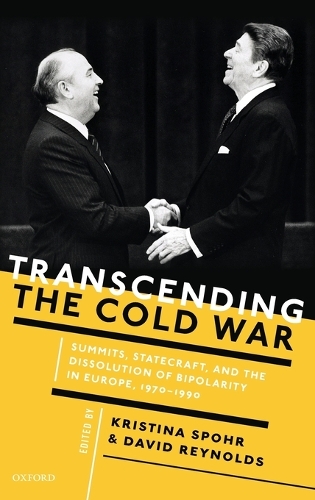
Transcending the Cold War: Summits, Statecraft, and the Dissolution of Bipolarity in Europe 1970-1990(English)
Series: English
In 1989 and 1990 the map of Europe was transformed peacefully, without the wars which caused the other great ruptures of the international order in 1815, 1870, 1918, and 1945. What role did international summitry play in the denouement of the Cold War? Scholars have tended to focus on long-term systemic factors, Gorbachev's reform agenda, or the impact in 1989 of 'people power'. This major multina
1970
VOLUME
English
Hardback

In 1989 and 1990 the map of Europe was transformed peacefully, without the wars which caused the other great ruptures of the international order in 1815, 1870, 1918, and 1945. What role did international summitry play in the denouement of the Cold War? Scholars have tended to focus on long-term systemic factors, Gorbachev's reform agenda, or the impact in 1989 of 'people power'. This major multinational study, based on archives from both sides of the 'Iron Curtain', adopts a novel perspective by exploring the contribution of international statecraft to the dissolution of Europe's bipolar order. This is done through the examination of key summit meetings from 1970 to 1990 across three phases - 'Thawing the Cold War', 'Living with the Cold War', and 'Transcending the Cold War' - and in three main strands: the superpowers and arms control, their triangular relationship with China, and the German question. The threads are drawn together in a sweeping analytical conclusion. Transcending the Cold War includes fascinating insights into key statesman such as Richard Nixon and Ronald Reagan, Leonid Brezhnev and Mikhail Gorbachev, Willy Brandt and Helmut Kohl, Zhou Enlai and Deng Xiaoping - both as thinkers about the international system and also practitioners of summit bargaining. Particular attention is devoted to the cultural dimension of summitry, as performative acts for the media and as engagement with 'the Other' across ideological divides. Written in lively prose, this volume is essential reading for those interested in modern history, contemporary politics, and international relations - addressing issues that still shape the world today.About the Author: Kristina Spohr is associate professor of international history at the LSE. German-Finnish by birth, she studied at the University of East Anglia, Sciences Po Paris, and Cambridge University, and also worked for a year in the NATO Secretary General's Private Office in Brussels. Her publications include The Global Chancellor: Helmut Schmidt and the Reshaping of the International Order (2016); Germany and the Baltic Question after the Cold War: The Development of a New Ostpolitik, 1989-2000 (2004); and At the Crossroads of Past and Present: Contemporary History and the Historical Discipline (co-editor, 2011). Her TV credits as presenter of historical documentaries for the German station ZDF include the five-part Geheimnisse des Kalten Krieges (2015) and Helmut Schmidt (2016). David Reynolds is Professor of International History at Cambridge and a Fellow of Christ's College. He was elected a Fellow of the British Academy in 2005. He is the author of eleven books and three edited books, including The Long Shadow: The Great War and the Twentieth Century (2013), winner of the Hessell-Tiltman Prize and Summits: Six Meetings that Shaped the Twentieth Century (2007). In Command of History: Churchill Fighting and Writing the Second World War (2004) was awarded the Wolfson Prize. He has also written and presented thirteen historical documentaries for BBC TV, as well as the award-winning Radio 4 series 'America, Empire of Liberty'.
Price Comparison [India]
In This Series
Bestseller Manga
Trending NEWS




















